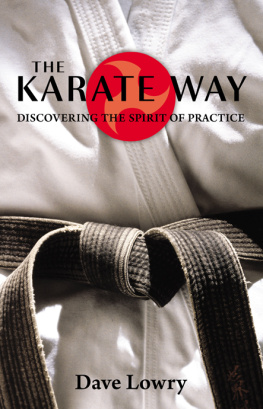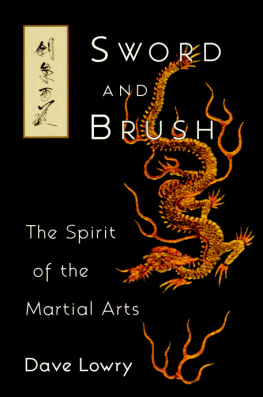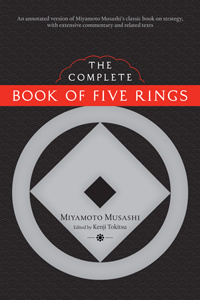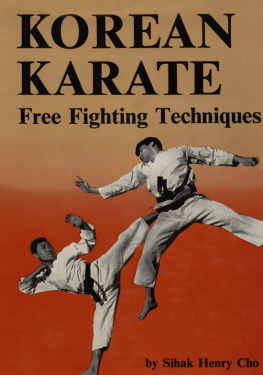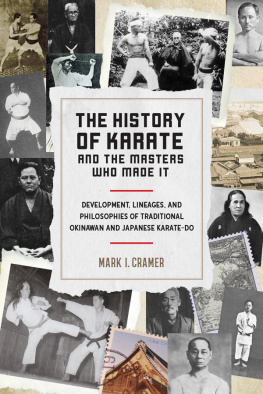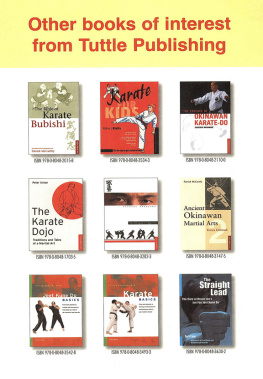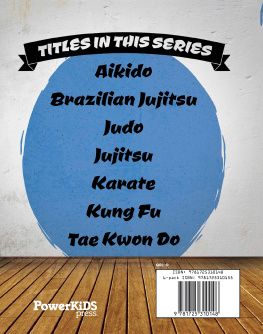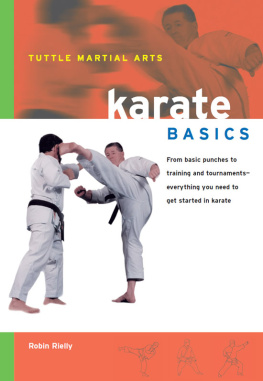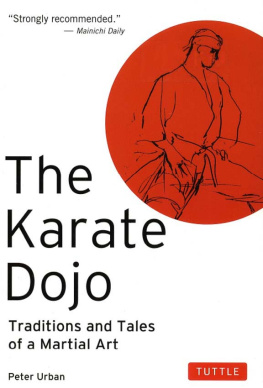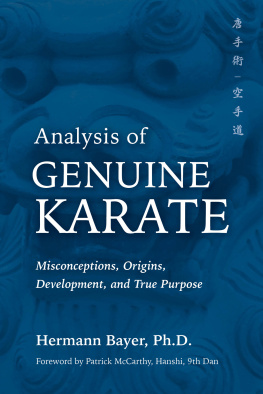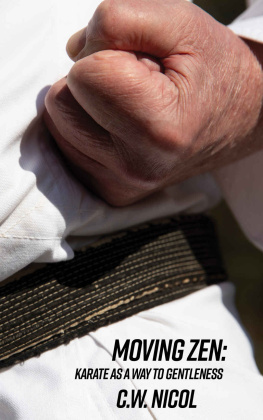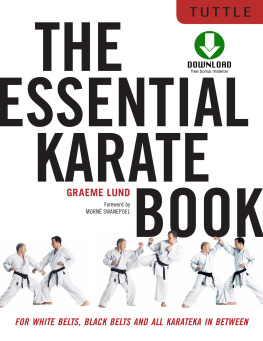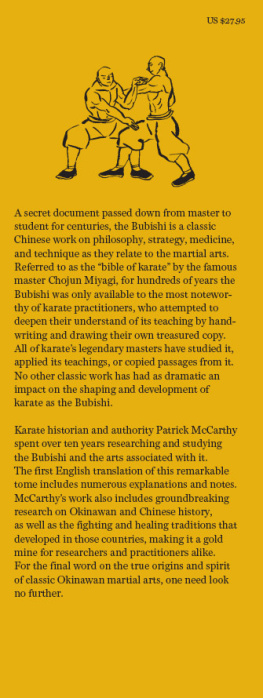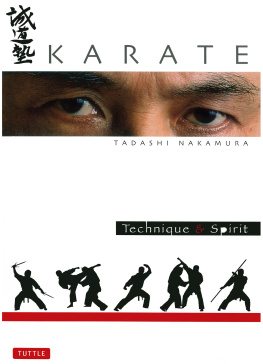ABOUT THE BOOK
Karate is not just a sport or a hobbyits a lifetime study toward perfection of character. Here, Dave Lowry, one of the best-known writers on the Japanese martial arts, illuminates the complete path of karate including practice, philosophy, and culture. He covers myriad subjects of interest to karate practitioners of all ages and levels, including:
- The relationship between students and teachers
- Cultivating the correct attitude during practice
- The differences between karate in the East and West
- Whether a karate student really needs to study in Japan to perfect the art
- The meaning of rank and the black belt
- Detailed descriptions of kicks, punches, evasions, and techniques and the philosophical concepts that they manifest
- What practice means and looks like as one ages
- How the practice of karate aims toward cultivating character and spiritual development
After forty years studying karate and the budo arts, Lowry is an informative and reliable guide, highlighting aspects of the karate path that will surprise, entertain, and enlighten.
DAVE LOWRY is an accomplished martial artist, calligrapher, and writer. He is the restaurant critic for St. Louis Magazine and writes regularly for a number of magazines on a wide variety of subjects, many of them related to Japan and the Japanese martial arts. He is the author of numerous books including Autumn Lightning: The Education of an American Samurai, Sword & Brush: The Spirit of the Martial Arts, Clouds in the West: Lessons from the Martial Arts of Japan, and The Connoisseur's Guide to Sushi.
Sign up to learn more about our books and receive special offers from Shambhala Publications.

Or visit us online to sign up at shambhala.com/eshambhala.

Discovering the Spirit of Practice
Dave Lowry

SHAMBHALA
Boston & London
2012
Shambhala Publications, Inc.
Horticultural Hall
300 Massachusetts Avenue
Boston, Massachusetts 02115
www.shambhala.com
2009 by Dave Lowry
Cover photograph: Comstock Production Department/Comstock Images/Punchstock
Cover design by Daniel Urban
All rights reserved. No part of this book may be reproduced in any form or by any means, electronic or mechanical, including photocopying, recording, or by any information storage and retrieval system, without permission in writing from the publisher.
Library of Congress Cataloging-in-Publication Data
Lowry, Dave.
The Karate way: discovering the spirit of practice / Dave Lowry.1st ed.
p. cm.
eISBN 978-0-8348-2458-4
ISBN 978-1-59030-647-5 (pbk.: alk. paper)
1. Karate. I. Title.
GV1114.3.L694 2009
796.8153dc22
2008032449
For Cyna, Mina, Laura, and Mattkarateka, friends
Out of a misty dream
Our path emerges for a while, then closes
Within a dream.
Ernest Dowson
CONTENTS
I forewarnand apologize. Before you are through with this book, assuming you finish it at all, you may well become irritated with my frequent use of the word serious, as in the serious karateka or the serious dojo. There is a whiff of the self-congratulatory smugness in this locution: If you are serious about your karate-do you will perforce agree with my points and observations and if you take exception to themwell, you are not quite so serious as you ought to be. That may be the aroma you detect coming off these pages. It is not the recipe I have written here, however.
Karate-do, along with the other modern martial Ways of Japanjudo, kendo, and aikidois at an interesting and important step of maturation in the West. There are karate practitioners here who are as accomplished, polished, and masterful as anyone practicing karate in Japan. (The same may be said of budoka in the other arts.) There are a great many more who have the potential to be at that level but who are, for various reasons, not thereand not headed in the right direction exactly to get there. In some instances, this will be because they are insufficiently motivated. There is nothing necessarily wrong with that. The fellow goes to the dojo three times a week, practices hard, and does what he is told by his teacher. He has been reminded that constant repetition is the key to the eventual mastery of karate. So he makes a thousand reverse punches when that is the exercise demanded in class that night, repeats his kata one hundred times a week. He thinks at times he is improving; at other times, he feels he is stuck in the proverbial rut. It does not particularly matter. He knows perfection is an ever-receding goaltheres something Zen about it. Or so hes been told. Dont worry. Just keep at it. And truth be told, that does not bother him. He likes his dojomates. He likes the socialization of the dojo, likes the exercise; he enjoys a bit of competition now and then. He appreciates the mental challenges and benefits, emotional and psychological, from karate-do. There is something that feels good about karate and he does not feel any pressing need to question or to go any further into things. That fellow is getting what he wants from his karate. To think of it another way, he is like a mountain climber who has reached a certain elevation and is happy there. He may understand there are higher peaks in the range. Yet he will decide that, for him, this is high enough, thank you. He likes the scenery here, so he is content to knock about at that level, wandering around the mountain, exploring a little here and there at that height, yet never venturing higher.
Another karateka may be a member at that same dojo. He attends just as regularly, trains just as hard, and follows the advice and instructions of his sensei. He, too, recognizes he will never actually perfect his art, that the goals become more and more distant the harder and longer one trains. Nevertheless, he suspects there is more out there for him. There is something in the Way of karate he is not yet getting. There are pathways on the journey for which he has no map. He is like a climber who has reached a particular elevation and instead of looking around and being satisfied with his surroundings, gazes upward and wonders, Whats it like up there and how can I get there?
From my perspective, the first karateka is sincere and honest about his art. He is simply not as serious as the second. It is not fair to chastise the climber who has scaled a peak to a respectable elevation and who is content with his accomplishment. I am in awe of climbers who make it to the base camp of Everest, even if they never go a step higher. Still, while not judging either and acknowledging both as mountaineers, we must make a distinction between the climber happy at base camp and the climber who pulls on his crampons and takes up his ice ax and keeps pushing higher.
Too many karatekaand budoka in generalare hiking about determinedly, going around and around the mountain, either believing they are actually going higher on it or frustrated because they sense the higher elevations and lack a route up. Too many karate sensei, well-meaning perhaps, are invested in teaching their students that they, as teachers, know the way upJust follow along and I will take you therewhen in truth they have climbed no higher themselves and havent a clue how to do so.
I have not been to the top of the mountain of karate-do. I may, in fact, be only a couple steps ahead of you. I have been blessed and fortunate to have had teachers who have climbed higher and who have been generous in showing me the path. I am still following their lead. I am not yet content at the elevation where I am now. In pushing on to higher peaks, I in no way disparage those who do not want to follow or go along with me. I want more, though. I have benefited enormously by having climbed to where I am now, by taking the advice of those who have gone before. I am confident they have shown me a route that will take me to where I want to go. That may not, in the end, be to the top of the mountain. (Here the analogy breaks down; there is no final summit and it is better to think of karate not as a single peak but, as I noted before, a wonderful and extraordinary range of mountains.) But I will climb at least to the heights that I am physically, emotionally, and mentally able to scale. It is some of that advice I am presenting here.
Next page
